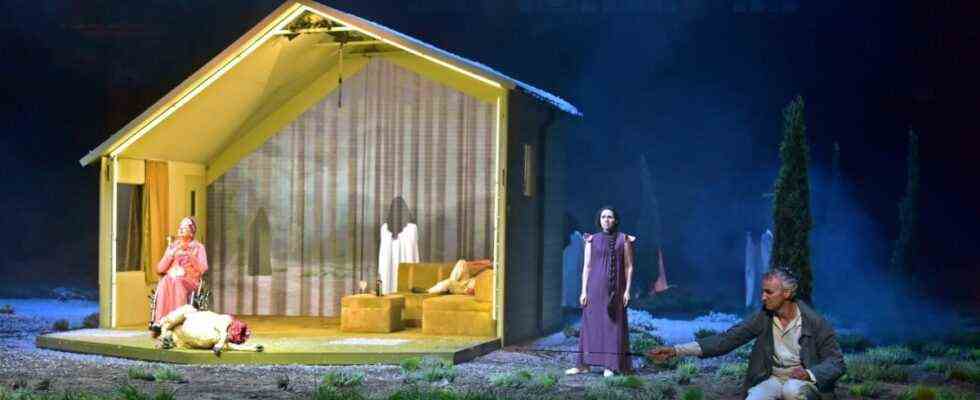A heathland without solid ground, full of ponds and swamps, in the twilight of eerie clouds of mist. Inside: a house that offers no protection because its outer walls regularly topple over like playing cards. The sandy soil with its scruffy heather plants runs out of shape in the auditorium, as if nature were to recapture what civilization was left over by man. On the left edge of the stage, the fabulous musicians of the Ensemble Modern under the direction of Sylvain Cambreling play in the dim light. Thanks to live electronics and feeds, the sound also penetrates unpredictably from all directions of the room, where there is eerie whimpering and crunching, smacking, chuckling and whirring even before the performance begins. It is a nightmare scenario of fundamental uncertainty that the stage and costume designer Nina Wetzel and the Irish directing duo Dead Center planted into the industrial architecture of Bochum’s Jahrhunderthalle for the first music theater premiere of the Ruhrtriennale. And as such, it offers the perfect ambience for the irrepressible and abysmal music-theatrical fantasy of the composer Olga Neuwirth, born in Graz in 1968, whose music vehemently defends itself against all unambiguous fixations and attributions.
Jelinek’s opera text lets the protagonist’s wishes emerge in a surrealist manner
The music theater “Bählamms Fest” in 13 pictures, premiered in 1999 at the Wiener Festwochen, was Neuwirth’s first full-length opera. As so often, the libretto was written by the writer Elfriede Jelinek. The literary model was the surrealist drama “The Baa-Lamb’s Holiday” by Leonora Carrington, the British artist born in 1917, who is best known as the temporary muse and “bride of the wind” of the surrealism pioneer Max Ernst. Until the occupation of France and Ernst’s arrest, the two artists lived together in a remote country house in southern France. Carrington’s 1940 drama processes the traumatizing experiences of those years into an abysmal, grotesque picture puzzle of family horror, relationship terror and fascist violence. Jelinek has created an ingeniously dense opera text, which, in a good surrealist manner, refuses a logical-realistic plot, but in the dreamlike montage of bizarre-grotesque motifs, the central wishes of the protagonist Theodora (Katrien Baerts) emerge all the more concisely. It’s about family violence, about a selfish mother-in-law (Hilary Summers) who sired a wolf man with her lap dog (Graham F. Valentine), about a drunkard husband (Dietrich Henschel) and his coloratura nagging first wife. Theodora escapes into the nursery, where she meets the ghosts of the pets she tortured and killed again. She falls in love with Jeremy, the Dionysus-like wolf man, who, however, also contains a beast that tears up innocent lamb after innocent lamb. After Jeremy fell victim to a hunt by the police, he encounters Theodora again as a ghost and admonishes her to stay young and beautiful forever, because otherwise he would not be able to love her. In a final picture, the young Theodora mutates into an old woman.
Neuwirth has created a panda-demonic sound space full of quotes, noises and musical finds, in which the foreign and the familiar, fulfillment and catastrophe, lie directly next to one another. The music box sounds of celesta and piano mix in the mostly soloistic instrumental gestures, the androgynous countertenor voice of Jeremy (Andrew Watts) is accompanied by a viola d’amore and mutates into the siren-like floating song of the electromagnetic Theremin-Vox, an instrument from the Primeval times of electronic music. The seemingly anarchic mixture of nursery rhymes and brutal sound discharges, operatic gestures and melodrama, distorted landlords and glassy, clinking sound bands merge miraculously to create a higher unity: this music never seems eclectic. Dead Center continues the surreal game with identities and duplications on stage in an optically suggestive way and happily resists the temptation to give the piece an interpretation that it could only reduce.

